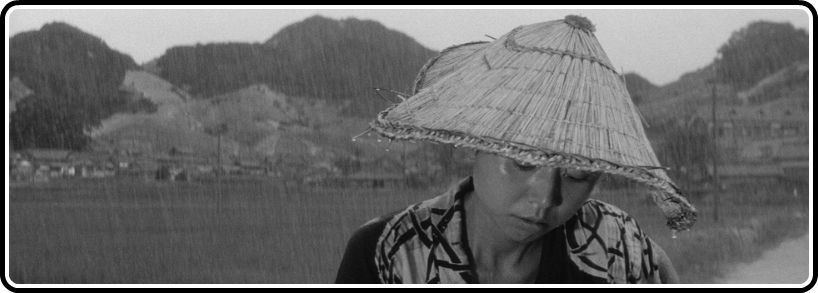
While more directly connected to their Kuroneko release (what with being by the same director and all), Kaneto Shindo’s landmark 1960 film shares some commonalities with Masters of Cinema’s other June release – Tabu. Both were made on and around islands, with native islanders comprising most of the cast. Neither film contains a single line of dialogue. And finally, both were financed by their directors as last-ditch efforts with dwindling capital. While Murnau spent nearly every cent he had, eventually having to sell distribution rights to Paramount just to keep paying his staff, Shindo’s production company was about to go under, and he figured that as long as he was calling the shots, he might as well make a “pure film” without a thought to its commercial prospects. As fate would have it, The Naked Island ended up saving the outfit.
Making a film with no dialogue at all is a daunting prospect – even Murnau’s closest effort required an intertitle to address his protagonist’s demotion – but Shindo does himself several favors by crafting a very simple setting and a very simple story. A family of four lives on a tiny island in the Seto Inland Sea that’s notable for having no fresh water source at all. Several times a day, the father and mother must row to the mainland, fill four buckets of water, row back, and carry them up and down the hillside of their little island, watering their plants along the way. A great deal of the film is spent just establishing their routine, which also includes the usual meal preparation, bathing, taking their sons to school, and so forth, so that when conflict is eventually introduced, the impact is all the more shattering.
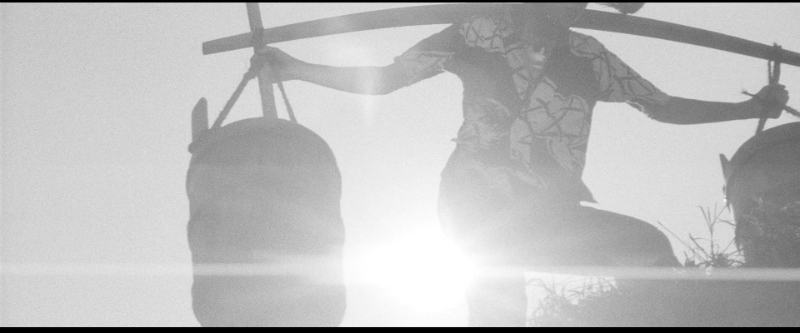
Though one quickly falls into step with this family, however, Shindo is careful not to let things get dull, frequently returning to the tension created by each careful, labored step up the terrain. It’s only a matter of time before something collapses, some tiny element is upset, and the difficulty of even accomplishing the simplest task is, here, a tremendous struggle. In one interlude, the boys capture a fish, which they eagerly show their father, knowing the family can sell it on the mainline for some extra cash, and take the closest thing they’ll get to a vacation in the process. But as they go to vendor after vendor, each one turns them away – even perceived bonuses are, in the end, reliant on another transaction. As repetitive as these endeavors necessarily are, however, the regenerative possibility of modest fortune keeps us attentive and hopeful, and the way Shindo continually underscores the sheer time everything they do takes, how little is often accomplished (the water seems to evaporate upon touching the ground) ends up paying off very dramatically when something truly catastrophic happens.
It’s a beautiful film, not just visually but in its very soul, though one with a spotty history, critically speaking. Joan Mellen’s interview, included with this release, starts off with an overview of critical reaction at the time, which was very positive, but was sometimes surprisingly condescending. The New York Times‘ Bosley Crowther, ever the model of the cluelessly square film critic, wrote, “The eloquence is in the fidelity, the solidity and clarity with which Kaneto Shindô… has embraced the rhythmic beauty of the landscape and the mountain-fringed waters of the bay and the rhythmic toil of its people.”
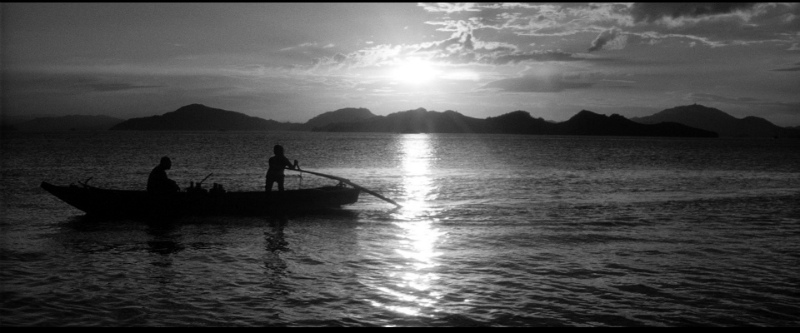
The other essay in the booklet, by Acquarello (I guess it’s like Madonna), makes mention of a tendency of an “aestheticized images of postwar Japanese life that was being projected to the international community in order to show that the nation had, indeed, truly recovered.” There’s a certain validity to this complaint, since the American occupation of Japan extended to its cinema, and only the slyest commentary was allowed through (one thinks of the influx of American logos in Late Spring, for example). However, just because Japanese films weren’t directly discussing the war, hardly means they weren’t addressing its effects. What becomes so potent about Ozu’s films, Naruse’s melodramas, or, yes, The Naked Island, is the sudden focus on the difficulty of modernity, the intense clash between Eastern and Western culture, the ways in which traditions hundreds, if not thousands of years old were very quickly overturned, replaced, or sanded over. What makes a film like The Naked Island so potent is that it speaks to all of those things, but by not addressing the specifics of the time, it becomes more ethereal, universal, and timeless.
In the commentary track, Shindo and composer Hikaru Hayashi discuss the decision – motivated as much by finances as anything else – to shoot in black-and-white, noting that it was integral to the story they were telling. If it were in color, the audience would just marvel at the sheer beauty of it; monochrome allows us to intellectualize, allowing, to use Shindo’s words, the expression to transpose the reality. True though that may be, I have to say, this new Masters of Cinema (Region-B locked) Blu-ray is exceptionally beautiful. Outdoing even their work on Kuroneko or Onibaba, this accounts for a thousand shades of gray, beautifully managed contrast, and a crisp-as-hell picture that never seems overcranked. A light coating of film grain gives some much-appreciated texture, but this thing has the feel of celluloid in its bones. [screencaps are provided by DVD Beaver]
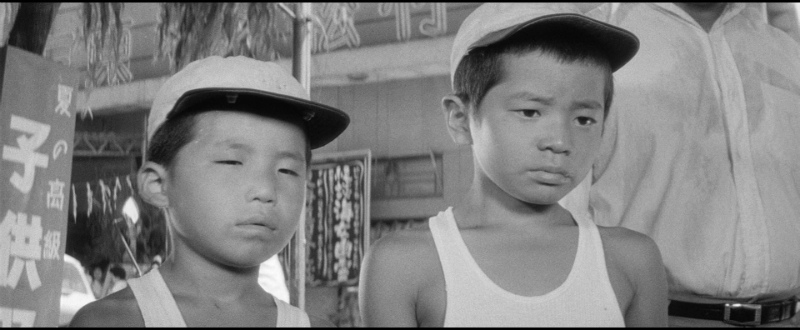
While not as great as his commentary on Onibaba, Shindo, along with Hayashi, provide a lot of great insight into The Naked Island. Naturally, given its dialogue-free nature, having the composer aboard makes a lot of sense, and his thoughts on finding a theme, which he recognized would need to be repeated over and over again with small tweaks, along with the role of music in general, are great to hear. Both recall the experience of shooting the film, being isolated on that island with a tiny crew, and its subsequent success. Well worth listening to, even if it doesn’t warrant a purchase all its own, as the track on Onibaba does.
Like that other disc, this also comes with an introduction by filmmaker Alex Cox, who provides a great overview of the film, so much so that you really ought to wait until after you’ve seen the picture. I don’t know what drives home video companies to label such spoilerific features as “introductions,” but they rarely refrain from giving anything away, and especially since this film has essentially one plot point, well, just wait on it.
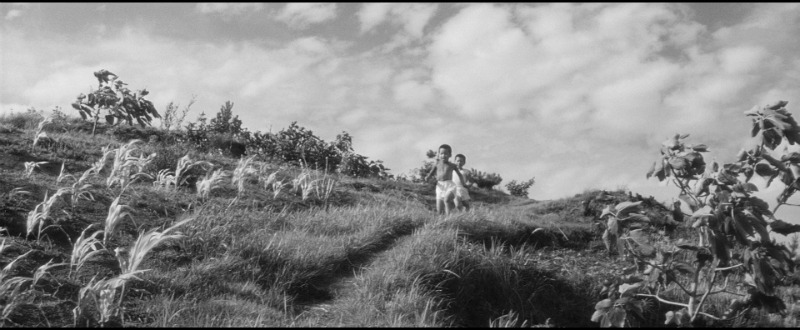
The booklet is nice, but not up to the standards of Masters of Cinema’s others. Acquarello’s essay is thorough, but written so academically that it becomes, at times, alienating, and Mellen’s interview is heavy on introduction, but the actual interview is only three pages. Still, all provide nice insight and context, and even though none of them stand out particularly, the essays, interview, commentary, and introduction work very well together to provide an overview of the film and its director. Coupled with the sheer quality of the film alone (let’s not forget that!), this is an extremely easy one to recommend, and an absolute must-see for lovers of art films the world over.


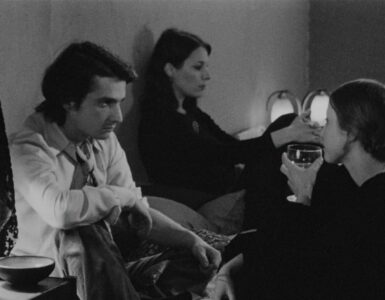
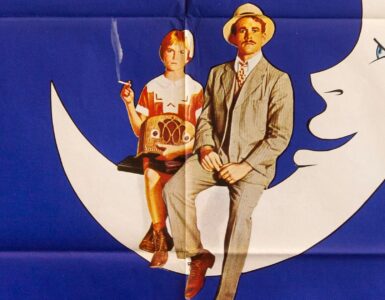

![Bergman Island (The Criterion Collection) [Blu-ray]](https://criterioncast.com/wp-content/uploads/2022/11/bergman-island-the-criterion-collection-blu-ray-400x496.jpg)
![This Is Not a Burial, It’s a Resurrection (The Criterion Collection) [Blu-ray]](https://criterioncast.com/wp-content/uploads/2022/11/this-is-not-a-burial-its-a-resurrection-the-criterion-collection-blu-ray-400x496.jpg)
![Lars von Trier's Europe Trilogy (The Criterion Collection) [The Element of Crime/Epidemic/Europa] [Blu-ray]](https://criterioncast.com/wp-content/uploads/2022/11/lars-von-triers-europe-trilogy-the-criterion-collection-the-element-of-400x496.jpg)
![Imitation of Life (The Criterion Collection) [Blu-ray]](https://criterioncast.com/wp-content/uploads/2022/11/imitation-of-life-the-criterion-collection-blu-ray-400x496.jpg)
![The Adventures of Baron Munchausen (The Criterion Collection) [4K UHD]](https://criterioncast.com/wp-content/uploads/2022/11/the-adventures-of-baron-munchausen-the-criterion-collection-4k-uhd-400x496.jpg)
![Cooley High [Criterion Collection] [Blu-ray] [1975]](https://criterioncast.com/wp-content/uploads/2022/11/cooley-high-criterion-collection-blu-ray-1975-400x496.jpg)